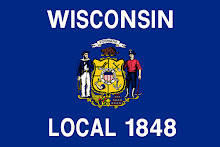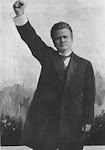A hearing is set on the Labor History Bill.
The Assembly Committee on Labor will hear testimony on AB 172 ... the bill requiring instruction in public schools on the history of organized labor in America and the collective bargaining process ... at 10:00 a.m. Wednesday, April 8, in Room 225 Northwest in the Capitol.
Please spread the word and encourage as many persons as possible to attend and register or testify in support. There are three other bills scheduled ahead of AB 172, so testimony on this bill won't be taken right away. It is important that as many as possible attend and register in support, because we finally have the opportunity to have this legislation signed into law.
Here are some tips on what to say:
Some Reasons Why We Need AB 172 . . .
The State Legislature needs to require every school district in Wisconsin to include the teaching of labor history and collective bargaining in its curriculum because:
Teaching about labor has been largely ignored in our schools. An examination of text books in history and the social sciences finds barely a mention about the contributions of workers and their unions in the making of our nation.
It’s time to balance the scales. Most school children readily hear about the corporate leaders and politicians of our nation’s history; rarely do they hear about the heroes among our working people who struggled to bring equity and justice into the workplace and into our communities.
Trade unions in Wisconsin and throughout the nation have contributed to our way of life. Such contributions include: the 8-hour day, health care insurance, vacations and holidays, a fair wage scale, safe and healthful working conditions, Social Security and Medicare, unemployment and workers compensation, plus civil rights, including voting rights laws. Our nation’s public education system, including its universities, is a product of the constant support of labor unions and their members.
Labor unions are part of Wisconsin ’s heritage. The state has always been at the forefront of worker struggles, including the Bay View Tragedy of 1886 during the 8-hour day movement, the Great Oshkosh woodworker strike of 1898 involving historic participation of Clarence Darrow in conspiracy trials, the creation of labor-management cooperation in the Wisconsin River valley that brought prosperity and labor peace to that area, the organizing among our industrial plants during the 1930s and 1940s, which brought about a good standard of living to our workers.
Most Wisconsin families have a labor tradition. By the 1950s, more than 35% of Wisconsin workers had joined unions. Their stories were “front page news” daily.
Cost of School Districts will be minimal. The proposed law leaves it up to each district to develop its own method of teaching about labor history and collective bargaining. Teaching materials are readily available, and can be inserted within existing curricula.
The story of labor and workers can provide more excitement in the classroom. The need to make history alive and interesting to students is critical in today’s schools. The struggles of working people will prompt many students to look back upon their own families and backgrounds, making history more relevant.
Prepared by Wisconsin Labor History Society, 6333 W. Blue Mound Rd. , Milwaukee WI 53213 . 414-771-0700. info@wisconsinlaborhistory.org
April 2009














Stupid law. It is not needed and besides, I remember getting more than more than my share of getting the positives about unions in school.
ReplyDeleteDan, are you not the total tool?
ReplyDelete